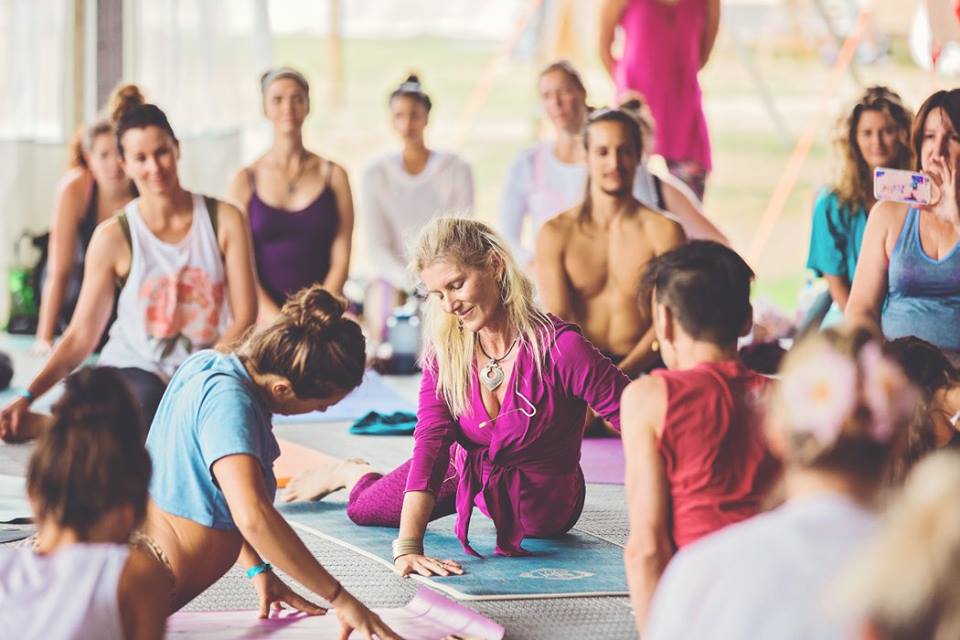
Shiva Rea at Wanderlust Great Lake Taupo. Photo Credit: June Bug Photography
by Kara-Leah Grant
How do I find a good yoga teacher?
How indeed?
First, start by defining what a good yoga teacher means to you, as it will be different for everyone.
What values and factors matter to you? What do you want in a teacher? Things you might want to consider include:
- location
- price
- skill set
- training
- style
- age
- sex
- attributes (kind, stern, funny…)
- experience
For example, if you’ve never done yoga before, and you have a limited budget but plenty of time your ideal yoga teacher may be an old-school experienced community teacher working a few suburbs away from you.
The price is cheap, you don’t mind travelling to get there, and the teacher is welcoming and supportive of beginners.
If you’re an experienced yoga practitioner and you want someone to take you to the next level, your ideal yoga teacher will be highly experienced, actively learning and training, and teaching classes tailored to more experienced students.
If you’ve got a specific injury that you want to use yoga to address, you’ll be looking for a teacher who’s got experience with yoga therapy and is available for one-on-one work.
Once you’ve got clear on exactly what kind of yoga teacher you’re looking for, then you can start the search.
Always pays to know what you’re looking for before you go looking right?
Start by asking anyone you know who practices yoga in your area – who do they recommend, who do they go to, who have they heard good things about?
Check out any local publications and see who advertises in there – newspapers, newsletters, magazines. Keep an eye out on the noticeboards in your local area, especially in health food stores, libraries, alternative stores or local colleges.
Do a google search using your location and variations of yoga classes/yoga teacher. See what comes up.
Once you’ve compiled a list of potential yoga teachers, classes and studios you’re ready for the next step.
Using all those different sources, compare the results to your list. Who looks or sounds like they might match up?
Find the bios or the about pages of teachers on their website and read them. Bear in mind that some of the best yoga teachers may not be on the internet at all – those are the teachers you find word of mouth.
Once you’ve got a list of teachers or classes that match your list of what you want, narrow it down to about three.
Call each of those teachers and have a chat to them. Ask them what their classes are like. Let them know what you’re looking for in particular (help with an injury or pain, to deepen your practice, get stronger, lose weight, start yoga for the first time).
Ask your top three yoga teachers about their own practice, who they trained with and what certifications they’ve got.
Listen to the response – that’s the most important thing! And while you’re listening to the response, notice how you’re responding – not so much in your mind, but in your body. Tune into your own intuition. Sometimes the teacher that sounds and looks good in marketing material is not the best teacher for you.
Based on your short list and those conversations, choose a class to go to. Take a friend if you can. It can be really useful to have someone else’s input, and support when you’re going to a brand new yoga class.
When you go to class, pay attention to the important things and forget about the rest.
The room is best if it’s warm or cool enough, dry and clean with good light. Beyond that, fancy fittings don’t really matter. What does matter is the teacher.
- Do you get to meet them before class?
- Do they ask you about your experience level and body?
- How do they address the class when they start?
- Do they create a safe space for people to explore.
- Is the class challenging but accessible?
- Do you feel better after class?
- Is the teacher available after class to answer any questions you may have?
At it’s very best, a yoga experience is a shared relationship between a teacher and student.
Over time, you will be able to cultivate a relationship with your teacher that supports your practice. But it’s your responsibility as a student to tell the teacher anything you think might impact your practice. If s/he is to keep you safe, full disclosure is necessary!
In fact, it’s really important that if you have any specific health issues – high blood pressure, fused discs or the like, that you tell the teacher well before class – maybe in that initial phone call.
It’s important that the teacher knows what that means and how to modify the postures for you. Ideally, if you have a specific issue, it’s a good idea to talk to the teacher before you come to class so s/he has time to talk to you about what that means in class and prepare you for any modifications.
In the end, a good yoga teacher is knowledgable, thorough, kind, caring, patient and knows how to take care of you.
The best teachers will also gently push you in the right direction, beyond your comfort zone. They will see you – truly see you – behind the mask of ego you wear. This can be uncomfortable because they may challenge you on some of your comfort behaviours – like having to always have the same spot for your yoga mat. You may find that sometimes, you don’t even like them. That’s ok – as long as they respect your boundaries and help to keep you safe.
If you follow these steps, and bring full awareness and attention to the process as you do (that’s yoga right there), you will find the yoga teacher that is right for you.
You’ll just know.
And if you don’t, keep looking, they’re out there somewhere.

Leave a Reply